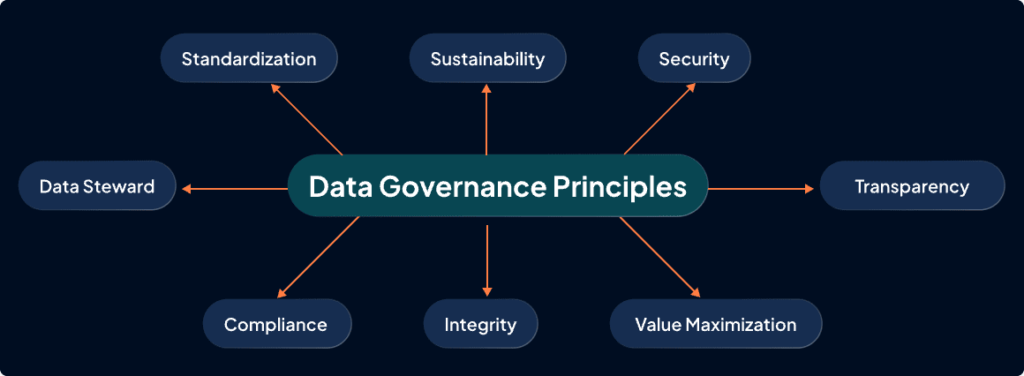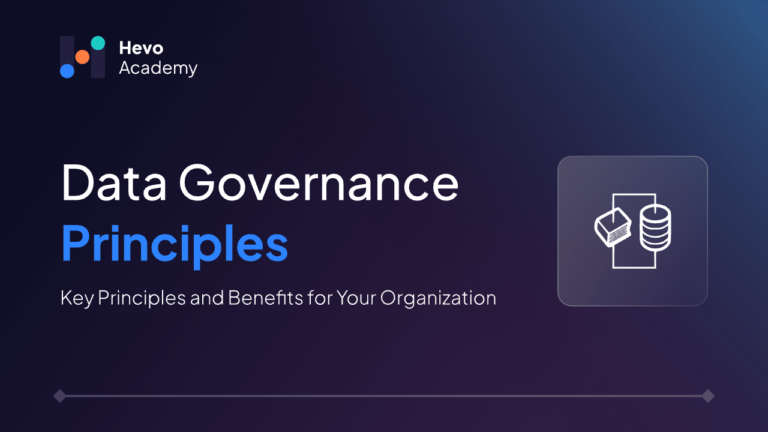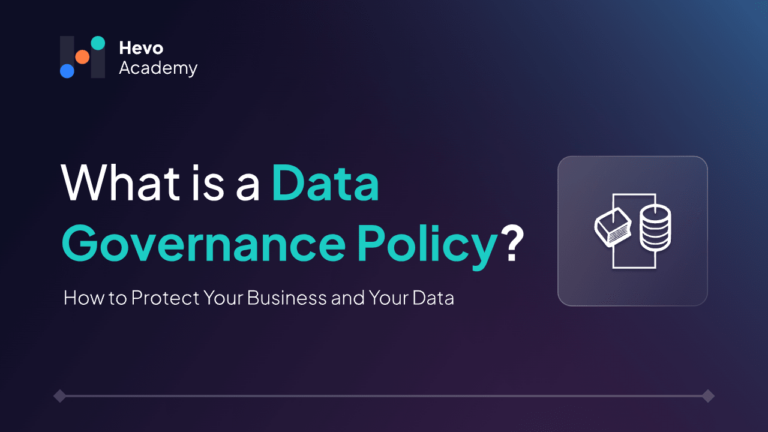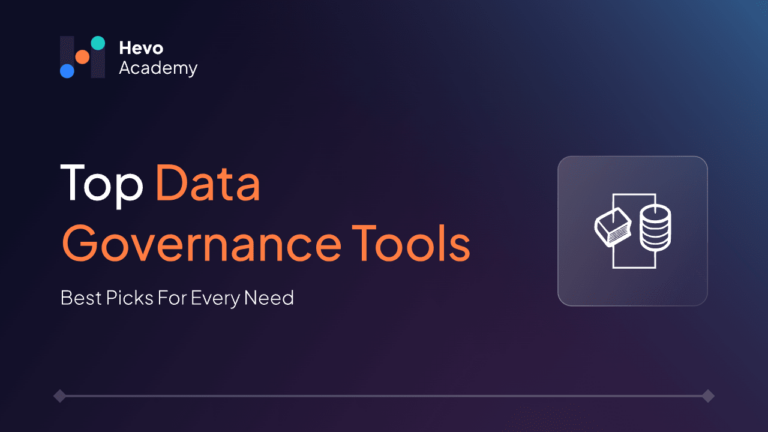In today’s big data management, organizations generate vast quantities of information every day. Without proper data governance, managing data becomes chaotic and even prone to security risk. Data governance guidelines help in managing effective data management within organizations. These guidelines establish a clear framework on how to manage data across its entire lifecycle, ensuring that data is accessed only by authorized users. This helps organizations improve data quality, reduce data compliance risks, and build trust among stakeholders.
Table of Contents
In this blog we will explore data governance, why it is needed, goals, and core data governance principles that help organizations manage their data effectively.
What is Data Governance?
Data has become one of the most valuable assets for organizations. The ability to collect data, store it, and utilize it effectively can significantly impact decision-making. From customer insights to internal operations, data helps organizations to make informed decisions that drive growth and innovation. Nowadays decision-makers no longer need to rely on intuition; instead, they can use data to gain insights into customer preferences, market trends, and industry shifts.
For example, data analysis can reveal customer behavioral patterns, helping businesses improve their marketing campaigns, and sales strategy to meet their customer needs. This enables companies to improve accuracy and reliable strategy. By analyzing historical data and trends, companies can predict potential risks and future outcomes. This futuristic thinking helps companies to stay ahead of competitors, adapt to new market challenges, and position themselves for sustainable success.
Without stronger data governance principles and techniques, data can become inaccurate, fragmented, and also difficult to use. Data governance frameworks establish rules for data validation, and data cleaning, and eliminate errors that can lead to data misinterpretation. Read about 6 Data Governance Mistakes that you should avoid as an organization.
Why do you need Data Governance?
Effective data management is vital for organizations to fully utilize the potential of their data while ensuring data security and data compliance. Data governance provides the guidelines and data governance principles that it is used to manage data effectively. Here are 5 reasons why you need data governance in your organization:
- High Data Quality: Data governance helps in maintaining improved data quality. By setting standards for data collection, validation, and maintenance, it reduces data errors, leading to high-quality trustworthy data for making informed decisions.
- Data Security: To protect sensitive information from unauthorized access and cyberattacks, stronger data governance frameworks are established to maintain access controls and monitor data access. This improves data privacy and minimizes security breaches.
- Data Integration: To improve organization performance and reduce silos across the organization data governance is needed. It helps streamline operations and achieve more accurate insights.
- Data-driven decision making: To make strategic decisions, data governance helps in providing clear, actionable data insights.
- Data Consistency: This is the fundamental data governance principles, as it ensures that the same data is being accessed across organizations, regardless of any systems.
Data governance is not only about compliance or security, it’s about making sure your data is a valuable asset that fuels organizational success. Read the differences between data governance and data security.
Goals of Data Governance
The goals of data governance are important as it helps in managing the data of an organization in a well-protected manner. To break down silos, data governance plays a major role in harmonizing the data, and improving accessibility for stakeholders across different systems within an organization.
Clear goals ensure that the data is reliable, consistent, and managed properly. Here’s why these data governance goals are important.
- To Optimize Data Usage: To optimize data effectively, data governance is implemented in alignment with the organization’s business goals.
- Impact: An organization’s value can be enhanced by using data to identify market trends and industry shifts, which drives innovation and contributes to business success.
- Reduce Financial Risk: Governance goals help identify and manage risks related to data breaches or misuse, ensuring that data is protected and compliance is maintained.
- Impact: Proper usage of data governance strategies in an organization helps reduce the chances of financial loss or damage to a company’s reputation. This helps the organization avoid any setbacks caused by poor data management.
- For example, a healthcare organization might implement data governance strategies to protect patient data, including providing regular staff training to ensure data is protected and handled properly.
- Collaboration and Support: Data governance fosters an effective collaboration between various departments and business units. By promoting a shared understanding of data management, governance encourages cross-functional support to address issues.
- Impact: When collaboration is strengthened through data governance, the organization can combine expertise from different teams to ensure that the data is secure. This provides a transparency and accountability culture within the organization.
- Better Decision-making: Having high-quality, readily available data helps make informed business decisions.
- Impact: With reliable and readily available data, businesses can make faster, more accurate decisions that drive business performance.
- For example, a logistic company with highly accurate well-governed reliable data can make faster decisions on shipping routes and optimize delivery times to reduce delays and costs, leading to efficient timely service.
- Disaster Recovery: In the event of system failure or any disaster, data governance helps establish a data backup recovery protocol. Data governance ensures that data is regularly backed up and stored for future use.
- Impact: In case of an unexpected system crash or disaster, a company with well-defined data governance practices can easily recover customer data or any important information without any complications. By having a solid recovery plan, it’s easy to resume normal operations after an outage, preventing data loss.
You can also take a look at our detailed guide on AI data governance to understand how organizations can manage AI-driven data responsibly.
Core Data Governance Principles
Ensuring that your data is well-maintained, secure, and accurate is more important than ever. This is where Core Data Governance Principles come into action. These 7 data governance principles provide a set of data guidelines and a structured approach to manage data, and ensure it remains accurate, consistent, and protected from unauthorized users. By clearly defining roles and responsibilities, data governance principles helps businesses maintain high data quality and compliance regulations.

A strong data governance framework allows businesses to make better choices and reduce financial risks. Here are the key data governance principles designed to help organizations maintain high standards.
1. Accountability
- Organizations should define clear roles, responsibilities, and accountability. Key roles such as Data Owners, Data Stewards, Data Custodians etc., each plays a unique role in managing and protecting an organization’s data.
- Data Owners make decisions about how and who can access data.
- Data Stewards focuses on day-to-day data management.
- Data Custodians are responsible for ensuring that the data is stored, well-maintained, and backed up.
2. Transparency
- Establishing a clear set of rules, policies, and transparent processes is important.
- As it helps to communicate with stakeholders and builds their trust in how their data is being managed.
- Transparency in these data management roles reassures stakeholders that data is being managed with integrity and in compliance with regulations.
- The data access decision made should be transparent, and it should be accessed only by authorized users.
3. Integrity
- Maintaining data integrity and its authenticity is important across systems.
- Data integrity refers to the accuracy of data across its lifecycle.
- Accurate data represents real-world conditions, which is essential for making business decisions.
- Without proper permissions, data should not be altered. Data integrity plays an essential role in preventing unauthorized access.
- For instance, if a patient’s medical history is recorded incorrectly, it could lead to inaccurate predictions and potentially harmful decisions. To maintain data integrity, regular checkups and verification should be implemented.
4. Compliance
- Compliance is the critical pillar of effective data governance. Read about other data governance pillars.
- It ensures that organizations follow all the necessary legal regulations while managing data.
- Various protection regulations such as GDPR (General Data Protection Regulation), CCPA (California Consumer Privacy Act), and HIPAA (Health Insurance Portability and Accountability Act).
- These laws have a set of procedures that explains how sensitive information should be handled, and stored.
- When data is transferred to different countries with different privacy laws, compliance ensures that the organization meets the required standards.
5. Security
- Data must be protected to maintain the confidentiality of sensitive information.
- Data governance ensures that data meets local, national, and international data protection regulations and industry standards.
- Having an effective incident response plan is important in case of a cyber attack.
- Data security in governance guarantees that data is regularly monitored and backed up.
- Staff members need to be educated on security protocols and best practices.
6. Standardization
- Standardization helps in creating uniform data management practices.
- It ensures consistency, quality, and data compliance.
- When standardization is applied to data, it streamlines data workflows and reduces risks.
- By standardizing data formats and terminologies, organizations can combine data more efficiently and improve data analysis.
- Every product should use unique naming conventions to avoid errors, regardless of where it is sold or which system it is entered into. This allows seamless integration and allows accurate analysis.
7. Value Maximization
- In data governance, value maximization refers to optimizing how data is managed and utilized based on business insights.
- It helps in making timely decisions based on real-time insights.
- Data governance helps reduce costs associated with data duplication, errors, and other inefficiencies.
- For a long time success, maximizing data value is important in the data governance aspect.
8. Sustainability
- Sustainability is about creating long-term data governance frameworks that not only maximize data value, but it should also protect data for future generations.
- It involves creating robust data protection measures to safeguard from potential risks or data-level threats.
- Sustainability data governance includes data storage practices like data archiving and using energy-efficient data centers.
- In a data-increasing environment, integrating sustainability into data governance not only protects an organization’s data assets but also enables it to thrive, innovate, and maintain stakeholder trust for years to come.
Core data governance principles such as data quality, data security, compliance, accountability, and accessibility are very essential for maximizing the value of an organization’s data. Adopting these basic data governance principles strengthen data-driven decision-making and helps mitigate risks.
Conclusion
In conclusion, data governance is crucial for organizations to manage, protect, and maximize data as a valuable asset. A strong framework ensures data accuracy, consistency, and security, supporting better decision-making and regulatory compliance. Basic data governance principles—accountability, transparency, integrity, security, compliance, consistency, and accessibility—establish clear ownership and data responsibility. As data grows, effective governance reduces risks, safeguards sensitive information, and optimizes value. It enhances operational efficiency, fosters trust, and drives innovation, giving organizations a competitive advantage in a data-driven world. Sound data governance principles helps organizations navigate challenges and thrive in today’s evolving digital landscape.
Try a 14-day free trial and experience the feature-rich Hevo suite firsthand. Also, check out our unbeatable pricing to choose the best plan for your organization.
FAQs
1. What are the data governance principles?
– Data governance refers to the set of processes, policies, and standards that ensure data is accurate and reliable.
– Effective data governance ensures data consistency, fosters trust, and enhances decision-making.
– Data should be easily accessible to authorized users.
– Clear roles and data responsibility should be established.
– Must adhere to legal compliance and industry standards.
2. What are the 4 core pillars of data governance principles?
Clear ownership and accountability for data management are essential.
Transparency in data management policies and processes.
Consistency and reliability across organizations.
Proper security measures to maintain sensitive information.
3. How do you measure the effectiveness of data governance?
The effectiveness of data governance is measured through metrics like data quality (accuracy, consistency), compliance with regulations, audit tracking, user access controls, and the reduction of data-related risks, ensuring data is reliable, secure, and accessible for decision-making.




